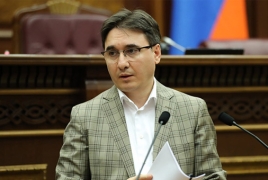
In an article published by the Alternative Projects group, former Deputy Prime Minister Armen Gevorgyan discussed Armenia’s potential EU membership bid, stating that the only "useful" aspect of passing such a law in Armenia would be its electoral exploitation by certain political circles. He warned that such an approach could damage public perception of European integration.
According to him, citizens’ hopes for an EU path might not align with reality, and the inaccessibility of membership could lead to renewed disappointment. Instead of pursuing a distant and challenging EU accession process, he suggested adopting a pragmatic approach to deepen EU-Armenia relations.
“The law itself could turn into an anti-Armenian tool rather than an opportunity for expanding development prospects. A clear example is the ratification of the Rome Statute, which brought no real benefits but escalated tensions with Russia. Baku is already exploiting this issue to pressure Armenia into withdrawing international legal claims, framing it as a prerequisite for a so-called peace agreement.
Passing such a law would give Russia leverage to impose constant demands on Armenia. Meanwhile, countries with strategic interests in the region—China, Iran, and India—would perceive Armenia’s geopolitical priorities as misaligned with BRICS or regional dynamics. While many will speak of Armenia’s sovereign right to choose, they will ultimately assess its choices based on their own national and alliance interests.
Additionally, we must not overlook the EU’s internal pro-Azerbaijani "gas coalition", consisting of states dependent on Azerbaijani energy, which serve the geopolitical interests of the Aliyev family and block Armenia-related initiatives. This marks the second instance where Azerbaijan, despite not being an EU member, significantly influences the Union’s decisions concerning Armenia,” the article states.
Gevorgyan warned that EU accession talks could drag on for decades with no tangible outcome.
"Even a membership referendum could fail. Instead of chasing an unrealistic goal, Armenia should propose a pragmatic cooperation program (not membership) that is mutually beneficial, results-driven, and offers tangible benefits to Armenian citizens."
He outlined five key focus areas for EU-Armenia cooperation beyond general political dialogue and ongoing projects:
1. Visa-free travel
The primary expectation of Armenian citizens regarding the EU is visa liberalization. Achieving this within 1.5-2 years should be a priority, as it would represent the first concrete success for the public. However, Armenia must ensure the issuance of biometric passports to meet EU requirements.
2. "Discover Armenia" tourism initiative
This program aims to attract 500,000 non-diaspora EU tourists annually, with a 7-8% growth rate in subsequent years. This would boost Armenia’s tourism sector—hotels, restaurants, travel agencies, and airlines. A targeted EU-supported promotional campaign should be launched to showcase Armenia’s heritage and tourist destinations.
3. EU-backed civil defense aid
If the EU is truly committed to supporting Armenia’s security, territorial integrity, and sovereignty, it should provide modern defense equipment through the European Peace Facility, not just tents and gas masks. Alternatively, discussions should focus on establishing a modern civil defense system across Armenia.
4. Expanding trade cooperation
Within the EU-Armenia Comprehensive and Enhanced Partnership Agreement (CEPA), Armenia must seek new economic opportunities to boost exports, diversify markets, and enhance product quality. The goal is to increase Armenian exports to the EU to €1.5 billion (2.5x growth). The EU could also launch a special branding initiative to promote Armenian wine, fruit juices, spirits, jams, and mineral water in European markets, which would create new jobs and reduce migration to the EU.
5. Innovation-driven economy and repatriation incentives
The EU should support Armenia’s innovation sector and jointly develop a repatriation program encouraging Armenians to return and contribute to science, high-tech, and industry.
According to Gevorgyan, these programs would:
-Generate €1.5 billion in additional economic benefits for Armenia
-Create 1,000-1,500 new jobs annually while maintaining existing employment levels
-Reverse migration trends, shifting to a positive balance of +5,000-10,000 people per year
On January 9, the Armenian government approved a proposal to initiate the EU membership process, submitted by the EuroVote civil initiative. The bill will soon be debated in parliament.
The EU will analyze Armenia’s government-backed proposal to start the membership process and discuss the matter with Armenian authorities, stated EU Foreign Affairs and Security Policy spokesperson Anita Hipper.
Meanwhile, Prime Minister Nikol Pashinyan is in Washington with his wife, attending the 5th Annual International Religious Freedom Summit and the National Prayer Breakfast.

